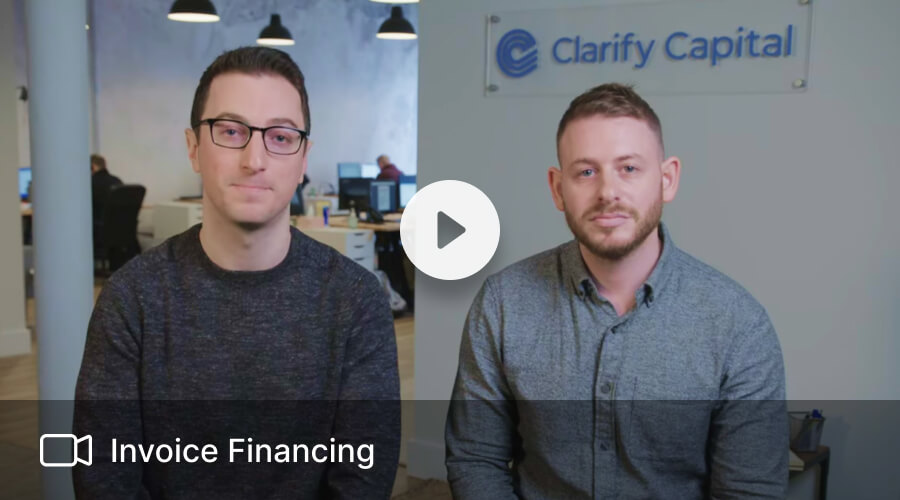What Types of Businesses Use Invoice Financing?
Invoice financing is most common among businesses that sell on credit and issue net terms.
Common industries include:
Staffing agencies. Cover payroll while waiting for client payments.
Transportation and logistics. Take care of fuel, tolls, maintenance, and emergency repairs upfront.
Manufacturers. Bridge gaps in working capital while ramping up production.
Wholesalers and distributors. Manage cash flow fluctuations, especially during seasonal peaks and valleys.
Government contractors. Offset dry spells during long procurement cycles.
What Are the Risks of Invoice Financing?
Invoice financing is a fast and flexible financing option. However, there are a few risks to consider when looking at this funding solution:
Repayment is still required. You're borrowing funds, not selling the invoice.
Customer payment issues. If customers pay late, you could owe interest or penalties.
Short-term structure. It's not ideal for long-term funding needs.
Clarify helps minimize these risks by evaluating your customers' payment history and structuring terms that work for your business.
Is Invoice Financing a Loan or an Advance?
Invoice financing is considered a short-term advance, not a traditional business loan.
You don't take on debt in the usual sense. Your outstanding invoices serve as collateral, and your business receives funds based on accounts receivable.
This makes it an attractive funding option for:
Startups with limited business credit
Companies with immediate cash flow needs
Businesses that want to avoid personal credit checks
It's also a good fit for founders who want to avoid equity financing and keep 100% ownership, while still accessing immediate cash.
How Quickly Can I Get Funds With Invoice Financing?
With Clarify Capital, you can:
Apply online in under two minutes
Receive approval in 24 hours or less
Get up to 90% of your invoice value upfront
Most businesses see funds in their bank account within one business day, depending on the invoice verification process.
How Economic Trends Are Shaping Invoice Financing
Small businesses are changing how they manage cash flow in 2026 due to rising costs, longer payment cycles, and tighter bank lending standards. Traditional financing options like term loans are harder to qualify for, especially as interest rates remain elevated and many banks have reduced their small business lending activity.
At the same time, more businesses are experiencing delayed customer payments and unpredictable cash inflows, making it harder to cover payroll, order inventory, or take on new projects. That's why invoice financing has grown in popularity as a fast, flexible way to unlock capital tied up in unpaid invoices.
Lenders are placing greater emphasis on invoice quality, including customer payment history and invoice aging, when evaluating financing applications. This makes it more important than ever to send accurate, timely invoices and keep clear records. Businesses that stay on top of billing and customer communications are best positioned to take advantage of this financing option.
Why Choose Clarify Capital for Invoice Financing?
Clarify Capital offers fast, flexible invoice financing designed for small businesses that need cash now, not weeks from now. You'll work with a dedicated adviser who understands your industry and helps you choose the best solution.
Funding available in as little as one business day
Get up to 90% of the invoice value upfront
No personal credit check required
No long-term commitments or hidden fees
Apply online in minutes. There's no obligation, and checking your eligibility won't affect your credit score.
Apply today to unlock capital from your unpaid invoices.
FAQs About Invoice Financing
We've answered some of the most common questions business owners have, from how quickly you can get funded to the key differences between invoice financing and factoring. Whether you're new to this type of financing or looking for specifics, you'll find clear, helpful answers here.
Will My Customers Know I'm Using Invoice Financing?
No. With invoice financing (unlike factoring), you continue to collect payments directly from your customers, so they won't know you've partnered with a business financing partner. This keeps the process discreet and maintains your customer relationships. Since Clarify doesn't take over collections, your clients interact with your business just as they normally would. It's a great option if you're concerned about preserving your brand's professionalism and customer trust.
What Happens if My Customer Doesn't Pay?
With invoice financing, you're responsible for repaying the advanced funds, even if your customer pays late or defaults. That's why Clarify reviews your customers' payment history during the application process to reduce risk. In some cases, late payments could result in additional fees or interest depending on your agreement. We work closely with you to structure repayment terms that align with your customers' typical payment cycles to avoid surprises.
Do I Need Good Credit To Qualify?
Not necessarily. Invoice financing focuses more on your invoicing history and the creditworthiness of your customers than on your personal or business credit score. That makes it a viable option for newer businesses, startups, or owners with past credit challenges. If your customers have a strong track record of timely payments, you can often qualify even without perfect credit.
What Is the Minimum Invoice Amount?
Most lenders (including Clarify) prefer to see invoice totals of $10,000 or more before they extend a financing offer. That said, there may be flexibility depending on your industry, the number of invoices you want to finance, and your monthly invoice volume. Businesses that regularly issue high-value invoices, such as manufacturing or logistics companies, may have other options they can consider. If you're not sure whether your invoices qualify, your Clarify adviser can help assess eligibility quickly.


